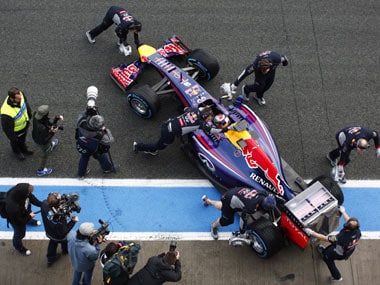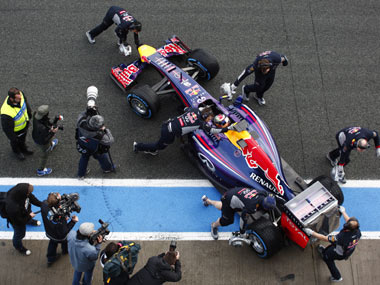Red Bull are at it again. No sooner had the flag came down on the season-opening Australian Grand Prix than the team’s advisor Helmut Marko issued the now-annual Red Bull quit threat. The formerly dominant champions had endured a frustrating race - Daniil Kvyat had failed to even make the start, grinding to a halt on his way to the grid, while home hero Daniel Ricciardo had finished an uncompetitive, lapped sixth. [caption id=“attachment_1431371” align=“alignleft” width=“380”]  The formerly dominant champions had endured a frustrating opening race. Reuters[/caption] Furthermore, far from having closed the gap to Mercedes after finishing second to the reigning champions in 2014, the formerly dominant multiple-title winners seemed to have fallen even further behind with even Ferrari having vaulted ahead of them. In the wake of such a dismal showing, Marko railed against Formula One’s new turbo-hybrid rules, dropping the Q-bomb and raising the prospect of an F1 exit for the outfit. “We will evaluate the situation again (in the summer) as every year and look into costs and revenues," Marko said, speaking in German to Austrian media. “If we are totally dissatisfied we could contemplate an F1 exit. Yes, the danger is there that Mr Mateschitz loses his passion for F1.” “These power units are the wrong solution for F1, and we would say this even if (engine supplier) Renault were in the lead.” “These rules will kill the sport,” he pronounced. Rewind twelve months to the Australian Grand Prix 2014 – the switch to the revolutionary 1.6 litre turbo-hybrid rules had knocked Red Bull off their perch as Formula One’s dominant squad. The team had regrouped to finish on the podium in Australia with Ricciardo scoring a fine second. But that podium had been taken away after the team had been found to have been using fuel at a faster rate than permitted by the rules. With the possibility that the team could be branded cheats, Red Bull owner Dietrich Mateschitz had made the following comments to an Austrian newspaper about his team’s continued participation in the sport: “The question is not so much about whether it makes economic sense, but more to do with the sporting value, political influence and the like. We have had it all but from our perspective there is a clear limit to what we can accept.” Granted the context the two comments were made in is not identical but the point is that Red Bull’s quit threat in the wake of Sunday’s race wasn’t surprising given they made a similar threat last year when they found themselves defeated, no longer dominant and on the back foot with circumstances not going their way. Indeed team-principal Christian Horner’s remarks following Sunday’s race betrayed the frustration within the team at the current state of affairs. Horner called for the FIA to use its rule-making power to peg Mercedes back, pointing out that the same had been done to Red Bull when they were dominant. Of course in purely sporting terms there is no reason whatsoever to peg Mercedes back or give Red Bull a helping hand. Both Renault and Mercedes were working to the same set of regulations. Mercedes just did the better job whereas Renault, in Christian Horner’s own words, have made a “retrograde” step. And this despite having now had a season’s worth of running with the power units and having won a reprieve from rules governing the development of the power units, allowing Mercedes and its rivals to add performance to their power units through the year rather than locking them down ahead of the season. Red Bull are behaving a lot like Ferrari have several times in the past, using their perceived indispensability to the sport to try and force Formula One to go in the direction that suits their interests best - much like the boy who threatens to walk off with his cricket bat in a huff at having been bowled out. In fact, Red Bull in many ways are the new Ferrari – the influence they wield has grown with their success on track even as the Prancing Horse’s political might has waned. The fact is that Red Bull have invested heavily in Formula One. They run two teams and host the Austrian Grand Prix which returned to the calendar last year. Besides, bilateral deals signed with Bernie Ecclestone have committed them to the sport up to 2020. There will come a day when Red Bull leave Formula One. Their core business is not racing unlike Ferrari, Sauber, Williams and McLaren. For them it’s primarily a marketing exercise and once their objectives are met or when they feel the returns no longer justify the cost, they will leave. But for now, the noises coming out of Milton Keynes would seem to be little more than posturing and foot stomping, stemming from a bruised competitive spirit that makes it incapable for the team to accept defeat.
Red Bull are at it again. No sooner had the flag came down on the season-opening Australian Grand Prix than the team’s advisor Helmut Marko issued the now-annual Red Bull quit threat.
Abhishek has only one passion in life. Formula One. He watched his first race on television way back in the mid-nineties with his father and since then has been absolutely hooked. In his early teens, he harboured dreams of racing in the top flight of motorsport, fighting wheel-to-wheel with the likes of Schumacher, Hill and Hakkinen but when it became evident that he didn't quite have the talent to cut it in go karts, let alone Formula One, he decided to do the next best thing - write about the sport. Abhishek is happiest when there's a race on television or when he's indulging in his F1 fantasies on the PlayStation. see more


)

)
)
)
)
)
)
)
)



